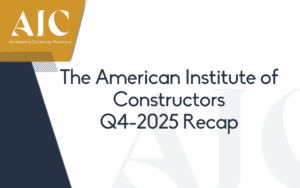As a construction professional, ethics must be a central factor in every decision made. One of the areas where ethical dealings is especially critical is job estimating.
Adhering to ethics in construction estimating is a critical way to build healthy relationships with project owners. Taking this approach will build trust and show your clients that you believe in ethical dealings.
Being ethical during estimating will also help prevent legal problems that many contractors face if they do not apply ethics to their pricing model. Let’s take a closer look at how to do your part in supporting ethics at the estimate stage.
Ethics in Construction Estimating: the Cost Factors
Before we can fully dive into how to apply ethics in construction estimating, it’s important to look at some of the factors that impact costs, and therefore creates the temptation to cut corners.
– A critical cost factor that affects contractors is the cost of labor. Having quality staff in place isn’t cheap, but you shouldn’t deceive clients by hiring lower-quality staff members. Not only do unskilled workers create a safety hazard for other employees, but the cost of redoing tasks on a job site will negatively impact your bottom line.
– Another major cost is the cost of supplies. Today, with inflation rates soaring, the price of materials has increased significantly. You must know how to negotiate prices with your vendors to continue to offer your clients quality materials at a fair price while still making a profit.
You should constantly assess the costs of materials and look for opportunities to get better deals. This way, you can pass those deals along to your clients instead of trying to shortchange your clients by using cheap materials.
– Permits, insurance, and other unseen costs should also be considered. While these items can’t be seen when you visit the job site, they are some of the most important aspects of the job at hand. Make sure you are ethical in how you estimate the cost of these line items to look out for the client’s best interests.
– Now that we’ve established some of the factors that impact cost in the construction industry, let’s look at how to support ethics in pricing a construction project.
Ethics in Construction Estimating: the Execution
The ethical tone you set at the beginning of a project will carry on throughout the entire project. Here’s how to set the right tone from the outset.
1. Be Ethical with Your Client from the Get-Go
Long before the first footer is poured or the first nail is driven, you will provide an estimate to your client. In most cases, this preliminary estimate is not a legally binding contract. However, it is still important that you operate ethically during this step of the process.
You should only offer an estimate that you truly believe you can meet. Underbidding just to get a job and then raising the cost once the contracts have been signed is unethical.
There have been multiple cases of construction companies facing litigation because they quoted one price to a client, and then increased the price after the project started. Obviously, once plans are in place, and the project has started, it’s hard for clients to terminate the contract and start over, leaving them feeling “stuck” in a deal they didn’t agree to.
Be Ethical in How You Staff a Job
Paying your crew a fair wage is not only an ethical issue but also a legal one. It’s also an opportunity to further your reputation as a quality construction firm.
Depending on the pricing structure of the job you’re performing, you may have an agreement in place that allows you to pass the cost of labor along to the client over the project’s lifespan. It is important that you do not pad time sheets in an effort to make more money.
Hiring skilled workers is important, as cutting costs by using unskilled labor is a recipe for disaster, as it could lead to safety issues, re-work, and bad press for the owner. Remember that should always strive to do what’s best for your client.
Be Ethical in Material Procurement
Finally, you must operate ethically when dealing with materials. For instance, estimating the cost of a job based on using high-quality materials and then using lower-grade materials is highly unethical and potentially illegal.
Clients who agree to a price based on the use of high-quality materials can bring litigation against your firm if they find out that you have used substandard materials. Additionally, when you agree in writing to purchase materials from one vendor, it is illegal to try to find cheaper materials elsewhere.
In May 2022, there was a report of a large lumber vendor suing a construction company that had agreed to purchase their lumber from them and then started looking elsewhere for the same materials. This breach of contract was not only unethical, but it was also illegal.
Stay Focused on Ethics in Construction Estimating
Estimating is a challenging task for any construction leader. There are many different factors to consider, and you may feel pressure to find ways to work the system in a favorable way for your company. Instead, remain focused on how to support your client through ethical dealings.
We are here to support your decision-making so that you can protect yourself and your company. To keep ethics top of mind, we encourage you to subscribe to our email newsletter. Each month, we circulate helpful articles about ethics in construction estimating and other ethical topics.
To sign up for our newsletter, drop your name and email address in the sign-up box at the bottom of this website page.




